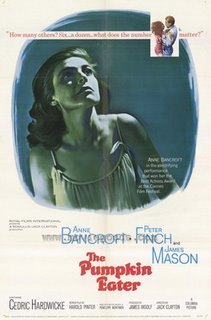
THE PUMPKIN EATER
UK, 1964, 111 minutes, Black and white.
Anne Bancroft, Peter Finch, James Mason, Cedric Hardwicke, Richard Johnson, Eric Porter, Alan Webb, Cyril Luckham, Yootha Joyce, Maggie Smith.
Directed by Jack Clayton.
The Pumpkin Eater 1s a complex and moving film about a difficult woman. She divorces her husband, remarries and takes her children with her. She craves love but her life is in her children. The couple begin to drift, he dallying with other women, yet also devoted to her and the children, she bordering on neurotic suspicion. As the situation worsens both husband and wife draw our sympathy and yet alienate us by doing stupid things. Things must come to a head.
Anne Bancroft endows the wife with a complex mixture of tenderness and selfishness. The symptoms of Mrs. Robinson are there, but they are tempered by a basically more gentle and loving personality. Peter Finch shows the same qualities in his portrayal of the husband and gives another fine performance. James Mason has a chance to do a different characterisation as a flighty and jealous businessman.
Direction is by Jack Clayton who has made few films but they have been outstanding: The Bespoke Overcoat, Room at the Top, The Innocents and Our Mother's House. Screenplay is by Harold Pinter. The opening 20 minutes or so are a clever use of flashbacks, the wife's memories shaded by the sadness and loneliness of her repeated wandering around her home and looking out windows. Pinter is absorbed by the conflicts of will between man and woman, so this screenplay, based on Penelope Mortimer's novel, is in his line of interest.
An absorbing adult movie.
1. What were your first impressions of Jo as she stood - even during the credits - looking out the windows, well-dressed but unhappy, walking around the house and remembering?
2. What was her relationship with her husband at the opening of the film?
3. Do you remember the quietly sad musical score at the beginning (and throughout the film)? How did it contribute to mood and atmosphere?
4. Why did Jo divorce her husband and marry again? Did she do the right -tiling/? How did it affect her? Her children? Did she love Jake?
5. Did the sequences with the fathers contribute to your understanding of Jo and Jake?
6. What kind of a woman Was Jo? Was she loving? Was she selfish? Was she neurotic? How ambitious was she? Why didn't she share her husband's professional life more? How important were children to her?
7. Why did Jo consider Philpott a friend? Was she suspicious of her husband? What about the questions about the fainting?
8. What kind of a man was Jake? Why did he marry Jo? Did he love the children? Was he a good husband and father? Was he at all lonely? Did he phase other women?
9. What was the significance of the psychiatrist sequence (and Jo's previous overhearing of the doctor's discussion with her husband)? What did it reveal about Jo as a person? Did you sympathise with her? Were you critical of her?
10. What did Jo’s awkwardness in the sequences with her older boys reveal about her?
11. What kind of a man was the character portrayed by James Mason? Why was it important that his boring and pedantic character be well established from the beginning?
12. What did you make of Jo's encounter with the frustrated wife at the hairdresser's? Did it contribute to your sympathy for Jo, to your understanding of her?
13. Should she have had the pregnancy? Haw did her mother's reaction affect her?
14. Was Jake genuinely concerned about her? Why did he advise her to have her operation? Was she happy to have had it?
15. Why did Bob Conway want to persecute her for her husband's affair? Why was he vindictive? Did he love his own wife?
16. What was Jo’s reaction to all this - and to the pregnancy of Beth Conway? Was she justified in her reaction?
17. Was there any point in her return to her former husband? Why did she? What did she expect to happen? Did this episode help you to understand her better?
18. After the clash of the two men in the bar, how did you know what was true about Jake 's behaviour and what was not?
19. Was the ending satisfactory? What do you think would have happened to them? Was all love lost?
20. Do you think this was a genuine picture of real people, their problems, suffering and complexities, the good and bad side to their personalities, their vulnerability and uncertainties? (The title refers to Peter, Peter, the Pumpkin eater, Had a wife and couldn't keep her, He put her in a pumpkin shell, And there he kept her very well.)